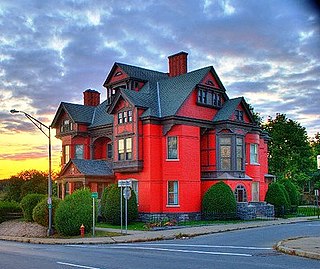Life
Born to Rynier Gardinier and Mary Newkirk, he married Catherine and had at least ten children.
He was Postmaster of Fultonville from 1841 to 1843. In 1853, he ran for Canal Commissioner on the Whig ticket against John C. Mather. He won the election and remained in office from 1854 until 1856.
The Commission to Explore a Route for a Canal to Lake Erie and Report, known as the Erie Canal Commission, was a body created by the New York State Legislature in 1810 to plan the Erie Canal. In 1817 a Canal Fund led by Commissioners of the Canal Fund was established to oversee the funding of construction of the canal. In 1826 a Canal Board, of which both the planning commissioners and the Canal Fund commissioners were members, was created to take control of the operational canal. The term "Canal Commission" was at times applied to any of these bodies. Afterwards the canal commissioners were minor state cabinet officers responsible for the maintenance and improvements of the state's canals.
John Cotton Mather was an American politician. In 1853, he was the first person tried by the New York Court for the Trial of Impeachments.
He died on October 21, 1892, in Darien, Connecticut, at the home of his son son-in-law J. H. Taylor.
This page is based on this
Wikipedia article Text is available under the
CC BY-SA 4.0 license; additional terms may apply.
Images, videos and audio are available under their respective licenses.

The United States presidential election of 1852 was the seventeenth quadrennial presidential election, held on Tuesday, November 2, 1852. Democrat Franklin Pierce, a former Senator from New Hampshire, defeated General Winfield Scott, the Whig nominee. This was the last election in which the Whigs served as the principal opposition to the Democrats.
Titus Hosmer was an American lawyer from Middletown, Connecticut. He was a delegate for Connecticut to the Continental Congress in 1778, where he signed the Articles of Confederation.
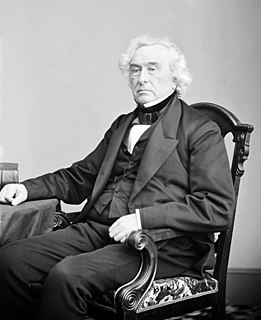
Francis Granger was a Representative from New York and United States Postmaster General. He was a Whig Party vice presidential nominee in 1836 and is the only person to ever lose a contingent election in the U.S. Senate for Vice President.
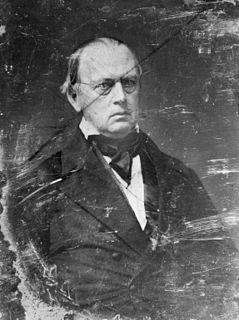
Truman Smith was a Whig member of the United States Senate from Connecticut from 1849 to 1854 and a member of the United States House of Representatives from Connecticut's 4th and 5th congressional districts from 1845 to 1849 and from 1849 to 1854. He also served in the Connecticut House of Representatives from 1831 to 1832, and in 1834.

Henry Baldwin Harrison was a Republican politician and the 52nd Governor of Connecticut.
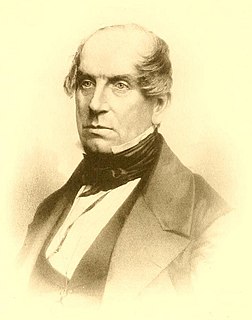
Ogden Hoffman was an American lawyer and politician who served two terms in the United States House of Representatives.
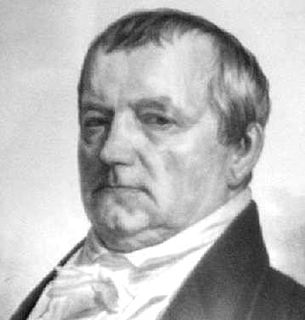
John Mattocks was an American Whig politician, a brigadier general in the War of 1812, U.S. Congressman, and sixteenth Governor of Vermont.

Charles Brewster Benedict was an American politician and a U.S. Representative from New York.
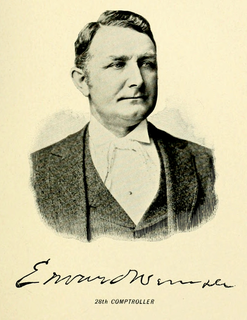
Edward Wemple was an American businessman and U.S. Representative from New York.
Jonas Phillips Phoenix was a U.S. Representative from New York.
John Bowman was an American lawyer, banker and politician from New York.
Nelson John Beach was an American surveyor, businessman and politician from New York.
Charles Cook was an American politician from New York.
Henry Fitzhugh was an American merchant, businessman and politician from New York.

The 1853 New York state election was held on November 8, 1853, to elect the Secretary of State, the State Comptroller, the Attorney General, the State Treasurer, the State Engineer, two Judges of the New York Court of Appeals, a Canal Commissioner, an Inspector of State Prisons and the Clerk of the Court of Appeals, as well as all members of the New York State Assembly and the New York State Senate.
Alexander H. Wells was an American lawyer, editor and politician from New York.
The 1855 United States Senate election in New York was held on February 6, 1855, by the New York State Legislature to elect a U.S. Senator to represent the State of New York in the United States Senate.
Joseph W. Seaver was an American farmer from Darien, Wisconsin who spent a single one-year term (1853) as a Free Soil Party member of the Wisconsin State Assembly from Walworth County.

